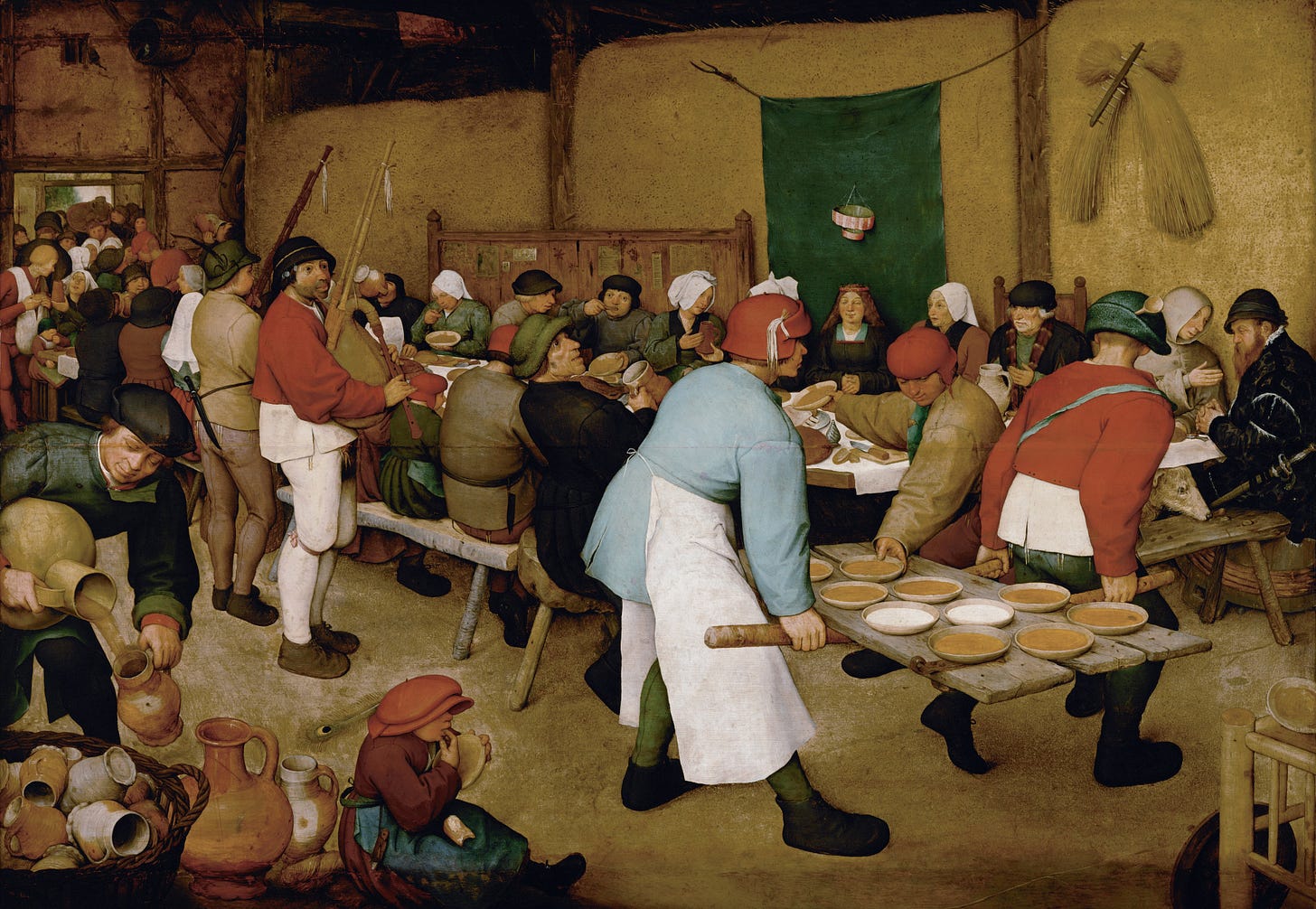Welcome all, especially folks who are here for the first time! You’ve landed in a good spot. You’ll see.
If you’re feeling chatty today, the comments are are a great place to share ideas and reflections. Meeting you there absolutely lights up my week! But, if you’re done peopling for the day—trust me, I get it—feel free to let me know you enjoyed the read by liking, sharing, and restacking (♻️) the post.
Oh, and did you know?
If clicking the 💚 takes you to an infuriating sign-in loop—trust me, I get it—you should have better success with the Substack app. Easy-peasy!
My daughter sends a viral video of beagles being released from a testing facility. They’ve never felt grass before. They step forward slowly, sniffing at the ground like it might swallow them whole.
“The world is a bad place,” she writes.
“And also a good place,” I reply. “Both are true.”
The contradiction lives in me. Some days I carry it like it’s contagious, other days it settles in my chest as grief over the fractures we feed and the loneliness we normalize into background noise. Distrust is high. Civility is low. And somewhere along the way, self-preservation turned into isolation. We move faster, speak less, curate our interactions by keeping eyes on screens, ears plugged with headphones.
But sometimes, when I’m out in the world and paying attention, I watch people open outward. In brief exchanges, along the soft edges of connection, I see something generous take root. As the distance between strangers narrows, they seem more complete.
I tell myself I’ll speak to everyone who looks my way. The grocery store is an unlikely place for a revelation, and I spend a minute considering how ridiculous this is. If the pattern of recent visits holds, at least half the shoppers here will be Spanish speaking. I speak next to none. Buenos días. Gracias. That’s about the extent of it. That might be a problem. I use my phone to look up a single sentence, just in case. Tienes una linda sonrisa. I practice saying it out loud until Google Translate recognizes it.
Eye contact is easy enough, and saying hello is a natural step from there. But ugh! Why am I so weird? I’m already letting myself off the hook. Maybe I don’t have the patience for this today. It needs to feel authentic.
I remember and regroup: the awkwardness doesn’t cancel out the goodness of the intention. They can sit side by side.
At the end of the first aisle, I spot an impossibly cute baby in a stroller, dark eyes that match a tiny thundercloud of black hair. I lean in to coo at her, then grin over my shoulder toward her parents. The mother, who is farther back selecting cucumbers, doesn’t see the exchange, but the father beams. I say something. His face answers for him. The whole event lasts seconds, but it breaks the spell of disconnection.
I know every interaction lives inside a complicated context. In a country where skin color and language differences are used to marginalize, offering even a greeting can feel suspicious. There’s risk, and there’s history. But also, there is kindness in the willingness to meet each other, however imperfectly, across those fragile lines. Both are true.
Every encounter carries a subtle transfer of energy. A nod. A glance. A comment about the weather. These gentle collisions don’t look like much, but they’re good at shaping the emotional temperature of a place.
Humans crave belonging, and there’s research to support what instinct already knows. In 2023, researchers at Sabancı University found that people who regularly engage in brief social exchanges—greetings, small talk, even a simple thank you—report higher levels of well-being than those who don’t. That sense of ease doesn’t exist in a vacuum. It correlates with other markers of social health like lower stress, increased trust, and greater civic engagement.
A few years before, psychologists Nicholas Epley and Juliana Schroeder asked Chicago commuters to strike up conversations with strangers on public transit. Most expected discomfort. Instead, those who spoke reported better moods than those who stayed silent, and so did their conversation partners. The act of reaching out felt awkward in theory, but in practice, it made people feel more alive.
The more we find ourselves in each other, the harder it is to turn away. The more rooted we are in a community, even one as temporary as a checkout line, the more likely we are to extend that care outward. Small talk isn’t just filler. It’s social glue.
It’s also a form of power, a tool we all carry, whether or not we feel equipped to use it. There’s no right way—just the attempt. And the attempt matters. It’s how we soften a culture grown sharp with distance.
I compliment a woman on her paisley blouse. “Lane Bryant,” she says, gleaming, her chin raising with a flicker of pride. When we pass each other in the next aisle, she offers that she’s DoorDashing for someone. I regret that I don’t see her again. I wish I’d told her I’ve never used DoorDash. I have so many questions I’m sure she could answer.
I tell a slender, 30-something that I love his hat. I really do—a saffron, straw fedora. His face lifts, and his posture straightens, like I just called him handsome.
These aren’t performances, they’re acts of recognition. They ask me to tolerate the twinges of discomfort in my gut, and in return, I am, paradoxically, more grounded. Not more human, exactly. I have no idea how I could feel any more human than I do lately. But more aware that I belong, that I’m part of the fabric of a place still mostly holding itself together.
No one is unraveling audibly in the cereal aisle. The planet may be trembling, but there is steadiness here, presence, a felt sense of being part of something normal.
I’m limited in my ability to undo the instability, the injustice, devastation, and cruelty unfolding in the world. But what if the vortex can be interrupted in the produce section? What if eye contact is solidarity? What if saying hello is resistance?
Psychologists call it psychological generosity, these small, low-effort behaviors that ripple outward. When someone feels seen, they’re more likely to see others. A single smile may not register as activism, but it’s a social investment, and it adds up.
These gestures won’t fix everything, and it won’t be obvious that they’ve fixed anything. But gathered across a culture, they can shift us toward one another instead of away. We become harder to divide. We become more likely to pause. We become more likely to care.
On the way home, I watch an ambulance surge through an intersection, the siren slicing the afternoon. I lift up the invisible patient inside, the one who needed an urgent intervention. I think of the caller, the driver, the medical team, the kin, people caring for each other.
Our interconnections are never more obvious. I don’t always get to be the one who changes the story, but I can be a person who stands against indifference.
I never quite work up the nerve to use the sentence I practiced in Spanish. Tienes una linda sonrisa. You have a nice smile. I carry it with me anyway, a pretty pebble in my pocket, an offering, a reminder that presence is its own kind of fluency.
Something still waiting to be said.
Maybe tomorrow, in aisle three.
~Elizabeth
As with any creative endeavor, every Chicken Scratch essay requires time and resources. Still, I intend to keep it free for everyone, regardless of means, because for me, that is a kind of kindness. I’m grateful you’re here. If you are able to consider contributing, you will be supporting more than just the words on these pages.
Paid subscription options can be accessed here, and one-time contributions can be made here. Any amount is worthwhile.
‘Til next time…








I really love your writing today.... At least for 20 years I have determined that God gave me almost every other day grocery shopping as my "holy ground..." From the time I exit my car and walk through the lot my eyes and body language try to say I care.... I'm always looking for the best deals and freshest veggies... But my heart is always shopping for a moment to love.... Way to go Betsy.... You are now an official grocery disciple...
I love this. Making the micro more beautiful certainly can enhance the macro. I do a lot of sociological work on the airplane...I say hello to every other person, or sometimes just the women or I mix up my comments. People love it when you tell them you like their shirt, their book, their tattoo. Growing up in Seattle there was often a "keep it to yourself" vibe attributed to the Scandinavian culture. When my mother visited me in Nashville she asked "Why does everyone tell you their life story?" Southern folks are much more likely to chat you up in the grocery store.